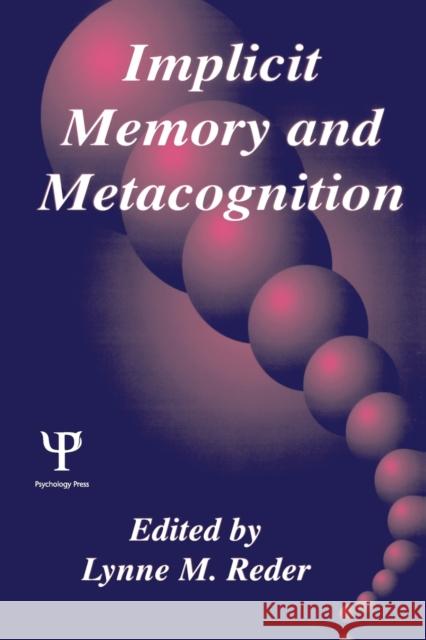Implicit Memory and Metacognition » książka
Implicit Memory and Metacognition
ISBN-13: 9780805818604 / Angielski / Miękka / 1996 / 376 str.
Implicit Memory and Metacognition
ISBN-13: 9780805818604 / Angielski / Miękka / 1996 / 376 str.
(netto: 298,48 VAT: 5%)
Najniższa cena z 30 dni: 302,19
ok. 22 dni roboczych.
Darmowa dostawa!
This volume explores the concept of implicit memory, taking it to mean that prior experience affects behaviour without the individual's appreciation of this influence. It also examines the opposite concept, metacognition, and explores the inter-relationship between the two fields.
Metacognition is a term that spans many sub-areas in psychology and means different things to different people. A dominant view has been that metacognition involves the monitoring of performance in order to control cognition; however, it seems reasonable that much of this control runs implicitly (i.e., without awareness). Newer still is the field of implicit memory, and it has different connotations to different sub-groups as well. The editor of this volume takes it to mean that a prior experience affects behavior without the individual's appreciation (ability to report) of this influence.
Implicit memory and metacognition seem to be at two opposite ends of the spectrum -- one seemingly conscious and control-oriented, the other occurring without subjects' awareness. Do these processes relate to each other in interesting ways, or do they operate independently without reference to each other? The relatively novel conjecture that much of the control of cognition operates at an implicit level sparked Reder's desire to explore the interrelationship between the two fields.
Developed within the last two decades, both fields are very new and generate a great deal of excitement and research interest. Hundreds of articles have been written about metacognition and about implicit memory, but little if any material has been published about the two areas in combination. In other words, Metacognition and Implicit Memory is the first book attempting to integrate what should be closely linked efforts in the study of cognitive science.











